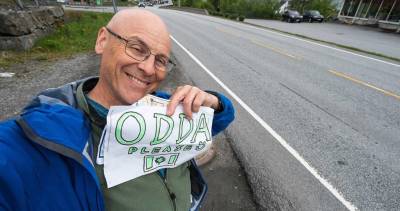Darwin Deez targets outside-the-box fans
For reasons that will become clear as the interview progresses, Darwin Deez takes a while to open up when he’s reached on the streets of Brooklyn, a small posse in tow. The singer-songwriter is headed to a studio session where he’ll be playing stripped-down versions of songs off his new sophomore album, Songs for Imaginative People. Initially, he comes off as either mildly distracted or a man of few words.
Five minutes into the conversation, however, there is a shift in Deez’s demeanour, with his answers suddenly becoming impressively thoughtful. From that point, the curly-haired artist speaks engagingly and intelligently on everything from his struggles with self-esteem to his love of 19th-century philosopher and poet Friedrich Nietzsche.
Nietzsche comes up when Deez is breaking down the creative process for Songs for Imaginative People, which was written after he packed up his belongings in New York and relocated to Asheville, North Carolina. It’s when discussing that move that the singer first becomes more animated. Coincidentally, the gang chatting in the background at the beginning of the call seems to have suddenly disappeared.
“I can’t write songs when other people are around,” Deez says. “I can’t even do interviews while other people are around—I don’t know why that is, I just can’t. So what I decided to do for Songs for Imaginative People was hole up for a year in Asheville to write a record. There was a lot of alone time. I’d take a 45-minute walk every day, working things out in my head. That’s something that Nietzsche did as well. He wrote his books while he was walking. That alone time really worked for me.”
Perhaps in a bid to live up to its name, Songs for Imaginative People targets those who aren’t afraid to think outside the box. Musically, it’s all over the place in the best of ways. The fantastic “Free (The Editorial Me)” dips Tom Petty in a vat of superfuzzed Mudhoney, “Chelsea’s Hotel” suggests Jonathan Richman dressed up in Sgt. Pepper finery, while “Good to Lose” gives math rock a major dose of psychedelics.
On the lyrical side of things, Deez swings back and forth between almost bright-eyed whimsicality and a ready-for-the-Prozac dark side. Nowhere, perhaps, is this duality better encapsulated than in “You Can’t Be My Girl”; drawing on everything from DIY funk to shrapnel-throwing metal, Deez starts out with “Damn, what drugs aren’t you on/And can I come along,” and then rolls out the clever kicker chorus “I think I love you are horrible.”
“The struggle is to not give in to the dark thoughts that we all can get,” he explains. “I used to have a lot of them about 10 years ago, a lot of really negative thinking. That’s what my song ‘Free’ is about—being able to get beyond that.
“It’s funny if you look at the different struggles that we have,” Deez continues. “In a lot of Third World countries, there is struggling, but people have a real sense of community to help them cope. We don’t really have that in North America. North America can be a very isolating place. We live alone in apartments. We go to work, but a lot of times we don’t even know and aren’t friends with our coworkers.”
His goal moving forward? In some way, it’s to bring people together. Deez might be most productive working alone, but he’s been thinking that nothing unites the masses like a perfect pop song—suggesting that even unimaginative people (read top-40–radio listeners) will find something to relate to next time out.
“My next record, I’m going to just write a bunch of great pop songs,” he says. “This record is all about the verses. The next record is going to be all about the choruses. I love a lot of Katy Perry and Avril Lavigne. I’m going to write the kind of songs that you can imagine Katy Perry singing.”















Comments